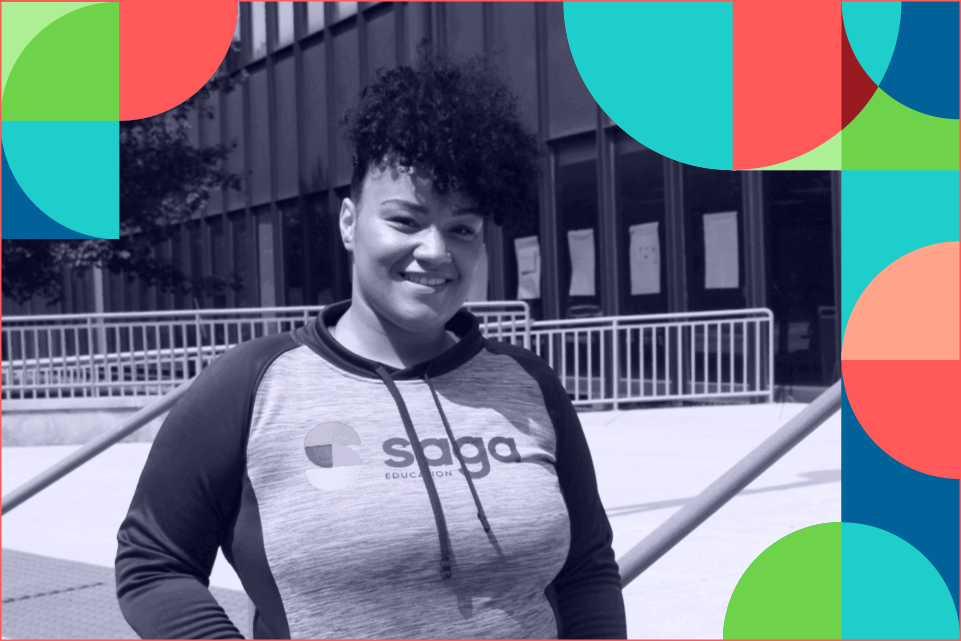Research
and Expertise

High-impact tutoring research
We invented high-impact tutoring as a core component of a school day, so that students can go deeper, teachers can move faster, and families can dream bigger. Several rigorous high-impact tutoring research evaluations found that students who received individualized math tutoring through Saga scored higher on exams, earned better grades, and were more likely to pass high school classes.
Saga meets national Every Student Succeeds Act (ESSA) evidence-based standards and is approved for Comprehensive Support and Improvement (CSI) or other Federal (Title) funds.
Saga Math Tutoring Earns “Top Tier” Evidence Rating
Social Programs That Work released an updated evidence summary affirming the high effectiveness of Saga Education’s in-school math tutoring models. Based on three large-scale randomized controlled trials (RCTs) in low-income high schools across Chicago and New York City, the findings validate Saga’s impact on 9th and 10th grade students.
The Impact of Virtual High Dosage Tutoring in New Mexico
Since 2022, NMPED has been working with Saga Education and the Personalized Learning Initiative to stand up virtually delivered high dosage tutoring for middle school math across the state and study its impacts on student learning. This brief summarizes the findings for school year 2023-24.
Can Technology Facilitate Scale? Evidence from a Randomized Evaluation of High Dosage Tutoring
Research published by the National Bureau of Economic Research and conducted by the University of Chicago reaffirms the impact of in-person tutoring on student learning. In a study of over 4,000 students, a high-dosage tutoring model alternating between in-person sessions and computer-assisted learning (CAL) showed substantial gains in math scores.
Human-tutor Coaching Technology (HTCT): Automated Discourse Analytics in a Coached Tutoring Model
This research paper discusses a new technology called human-tutor coaching technology (HTCT). HTCT looks at recordings of tutoring sessions and shows the information in a way that helps coaches give detailed advice to tutors. Researchers worked with Saga Education to test HTCT with coaches tutoring high school math in low-income areas.
Realizing the Promise of High Dosage Tutoring at Scale: Preliminary Evidence for the Field
UChicago Education Lab recently released preliminary results for the Personalized Learning Initiative (PLI) in a report titled “Realizing the Promise of High Dosage Tutoring at Scale: Preliminary Evidence for the Field.” The Personalized Learning Initiative (PLI) is a moonshot to overcome pandemic learning loss and aims to bring high-impact tutoring to students nationwide. The research builds upon earlier Education Lab research on Saga Education’s high-impact tutoring work, and it focuses on Saga Consult’s current partnerships with Chicago Public Schools, Fulton County Schools, New Mexico Department of Education, and a mid-sized school district in California. The report outlines preliminary PLI results showing that high-impact tutoring can be scaled successfully, especially for “districts that deployed their funding to deliver tutoring that was (1) delivered during the school day at a consistent, scheduled time; (2) delivered by trained and supported tutors; and (3) makes use of a structured curriculum that is aligned with the school’s instruction” (Page 15). The study features math results from approximately 2,000 students in Chicago Public Schools (IL) and Fulton County Schools (GA) who participated in districtwide in-school tutoring during the 2022-23 school year. Saga is the Ed Lab’s technical assistance and quality assurance partner for both districts. Saga students “saw large and positive gains on end-of-year test scores…equivalent to about two thirds of a year of learning, which would be enough to totally undo the effects of the pandemic for the average student” (Page 4). K-12 Dive also wrote about the report in a news article. (study includes students from minority groups, low-income families, English language learners, and with Individualized Education Plans)
The Impressive Effects of Tutoring: A systematic Review and Meta-Analysis
Tutoring—defined here as one-on-one or small-group instructional programming by teachers, paraprofessionals, volunteers, or parents—is one of the most versatile and potentially transformative educational tools in use today. Within the past decade, dozens of preK-12 tutoring experiments have been conducted, varying widely in their approach, context, and cost. Our study represents the first systematic review and meta-analysis of these and earlier studies. We develop a framework for considering different types of programs to not only examine overall effects, but also explore how these effects vary by program characteristics and intervention context. We find that tutoring programs yield consistent and substantial positive impacts on learning outcomes, with an overall pooled effect size estimate of 0.37 SD. The following working paper was developed by researchers at the Adul Latif Jameel Poverty Action Lab North America, based out of MIT. Saga Education is one of the primary organizations highlighted throughout the report.
